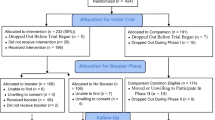Abstract
Research reveals multiple academic, behavioral, and psychosocial benefits of participating in family meals. The studies also reveal an inverse relationship between family meals and high-risk behaviors among youth. Family meal participation provides opportunities for Positive Youth Development (PYD) an emergent prevention science framework that emphasizes strengths and contextual resources rather than deficits of youth. This article reviews and integrates data that demonstrate the precise ways in which family mealtime positively impacts youth developmental trajectories. It is also maintained that counseling professionals are well-positioned to implement public education prevention measures and to facilitate changes in policy and social norms that encourage regular family meal participation and advance PYD.
Similar content being viewed by others
References
Bowers, E. P., Li, Y., Kiely, M. K., Brittian, A., Lerner, J. V., & Lerner, R. M. (2010). The Five Cs model of Positive Youth Development: A longitudinal analysis of confirmatory factor structure and measurement invariance. Journal of Youth and Adolescence, 39(7), 720–735. doi:10.1007/s10964-010-9530-9.
Brouzos, A., Vassilopoulos, S., Korfiati, A., & Baourda, V. (2015). Secondary school students’ perceptions of their counselling needs in an era of global financial crisis: An exploratory study in Greece. International Journal for the Advancement of Counselling, 37(2), 168–178. doi:10.1007/s10447-015-9235-6.
Child Trends. (2013). Family meals. http://www.childtrends.org/?indicators=family-meals
Brown-Chidsey, R., & Steege, M. W. (2010). Response to intervention: Principles and strategies for effective practice. New York, NY: Guilford.
Cho, E., & Allen, T. D. (2013). Work-to-family conflict and the family dinner: What makes a difference? Community, Work & Family, 16, 88–99. doi:10.1080/13668803.2012.722010.
Damon, W. (2004). What is positive youth development? The Annals of the American Academy of Political and Social Science, 591, 13–24. doi:10.1177/0002716203260092
Edwards, O. W. (2003). Living with grandma: A grandfamily study. School Psychology International, 24(2), 204–217. doi:10.1177/0143034303024002005.
Edwards, O.W., Mumford, V.E., & Serra-Roldan, R. (2007b). A positive youth development model for students considered at-risk. School Psychology International, 28, 29–45. doi:10.1177/0143034307075673
Edwards, O. W., Mumford, V. E., Shillingford, M. A., & Serra-Roldan, R. (2007a). Developmental assets: A prevention framework for students considered at risk. Children and Schools, 29(3), 143–153. doi:10.1093/cs/29.3.145.
Edwards, O. W., & Ray, S. L. (2010). Value of family and group counseling models where grandparents function as parents to their grandchildren. International Journal for the Advancement of Counselling, 32(3), 178–190. doi:10.1007/s10447-010-9098-9.
Edwards, O. W. & Taub, G. E. (2009). A conceptual pathways model to promote positive youth development in children raised by their grandparents. School Psychology Quarterly, 24, 160–172. doi:10.1037/a0016226
Eisenberg, M. E., Olson, R. E., Neumark-Sztainer, D., Story, M., & Bearinger, L. H. (2004). Correlations between family meals and psychosocial well-being among adolescents. Archives of Pediatrics and Adolescent Medicine, 158(8), 792–796. doi:10.1001/archpedi.158.8.792.
Fruh, S. M., Fulkerson, J. A., Mulekar, M. S., Kendrick, L. J., & Clanton, C. (2011). The surprising benefits of the family meal. The Journal of Nurse Practitioners, 7(1), 18–22. doi:10.1016/j.nurpra.2010.04.017.
Fulkerson, J. A., Story, M., Mellin, A., Leffert, N., Neumark-Sztainer, D., & French, S. A. (2006). Family dinner meal frequency and adolescent development: Relationships with developmental assets and high-risk behaviors. Journal of Adolescent Health, 39, 337–345. doi:10.1016/j.jadohealth.2005.12.026.
Glewwe, P., Jacoby, H., & King, E. (2001). Early childhood nutrition and academic achievement: A longitudinal analysis. Journal of Public Economics, 81(3), 345–368. doi:10.1016/S0047-2727(00)00118-3.
Heerde, J. A., Toumbourou, J. W., Hemphill, S. A., & Olsson, C. A. (2015). Longitudinal prediction of mid-adolescent psychosocial outcomes from early adolescent family help seeking and family support. Journal of Research on Adolescence, 25(2), 310–327. doi:10.1111/jora.12113.
Lerner, R. M., Lerner, J. V., Almerigi, J. B., Theokas, C., Phelps, E., Gestdottir, S., & von Eye, A. (2005). Positive youth development, participation in community youth development programs, and community contributions of fifth grade adolescents: Findings from the first wave of the 4-H study of positive youth development. Journal of Early Adolescence, 25, 17–71. doi:10.1177/0272431604272461.
Meier, A., & Musick, K. (2014). Variation in associations between family dinners and adolescent well-being. Journal of Marriage and Family, 76, 13–23. doi:10.1111/jomf.12079.
Neumark-Sztainer, D., Larson, N. I., Fulkerson, J. A., Eisenberg, M. E., & Story, M. (2010). Family meals and adolescents: What have we learned from Project EAT (Eating Among Teens)? Public Health Nutrition, 13(7), 1113–1121. doi:10.1017/S1368980010000169.
Skeer, M. R., & Ballard, E. L. (2013). Are family meals as good for youth as we think they are? A review of the literature on family meals as they pertain to adolescent risk prevention. Journal of Youth and Adolescence, 42(7), 943–963. doi:10.1007/s10964-013-9963-z.
Wilk, R. (2010). Power at the table: Food fights and happy meals. Cultural Studies ↔ Critical Methodologies, 10, 428–436. doi:10.1177/1532708610372764.
Zarrett, N., & Lerner, R. M. (2008). Ways to promote the positive development of children and youth. Retrieved from http://www.childtrends.org/?publications=ways-to-promote-the-positive-development-of-children-and-youth
Author information
Authors and Affiliations
Corresponding author
Rights and permissions
About this article
Cite this article
Edwards, O.W., Pratt, H. Family Meal Participation as a Corollary of Positive Youth Development: Opportunities for Counseling Services. Int J Adv Counselling 38, 89–96 (2016). https://doi.org/10.1007/s10447-016-9258-7
Published:
Issue Date:
DOI: https://doi.org/10.1007/s10447-016-9258-7




